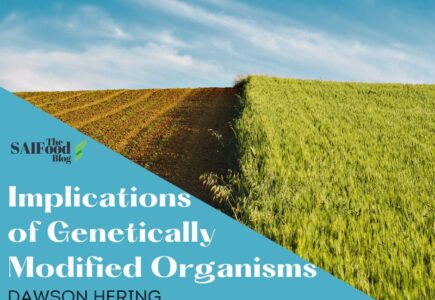By Dawson Hering, University of Saskatchewan student
Introduction
Growing up on a grain farm in Saskatchewan, I always assumed that farming was straightforward. People eat what is produced without questioning it because they have trust in the producers. I rapidly discovered that this is not the case and that there are some very major problems with food security around the world. The regulations of genetically modified organisms (GMOs) in crop production to improve food security is a hot topic being discussed today. Everyone eats and should feel secure about their food choices.
When everyone always has physical, social, and economic access to enough safe and nutritious food that satisfies their dietary needs and food choices for an active and healthy life, is what the Food and Agriculture Organization refers to as having “food security” (McCarthy et al., 2018). It is far more difficult to determine if a person or family has access to enough food at any given moment because of “demand-side variables, family income, governmental policy, [and] weather” (Erickson and Fausti, 2021). Additionally, it has become clear to address the issue of food security, policymakers, governments, environmental non-profit organizations, and everyone must engage in difficult conversations about issues like GMO restrictions (McCarthy et al., 2018).
GMO regulation
Public discussions about the cultural acceptability of GMO foods have taken place in the majority of industrialized and a sizable number of developing countries (Turner, 2011). These talks involve a variety of issues; most of which are expressed in terms of risk (Turner, 2011). These hazards included those relating to trade, health, way of life, and indigenous knowledge (Turner, 2011). Regarding the European Union (EU) and its efforts to ban GM foods, the most recent significant change to the EU rule allows individual member countries to choose not to cultivate genetically modified organisms for reasons unrelated to food safety (Davidson and Ammann, 2017). The World Trade Organization determined in 2006 that the EU’s position on genetically modified organisms was protectionist, in breach of the rules governing international commerce, and not based on genuine worries about health, biodiversity, and cultural traditions (Turner, 2011). It has become clear that maintaining cultural acceptance is challenging since it now involves something much more than just food safety.
GMOs in Agriculture
Our ability to precisely alter plant genomes to boost their nutritional value, survival chances and yields has been transformed by these new technologies (Hackett and Carroll, 2015). GMO proponents provide evidence that GMOs are necessary for promoting sustainable agriculture because they may be able to lessen the environmental impact of agriculture by lowering the use of pesticides, conserving fossil fuels, lowering CO2 emissions, and preserving soil and moisture (Buiatti, Christou and Pastore, 2012). For instance, a GM potato has been developed that is now resistant to the Phytophthora infestans disease that was the root cause of the Irish and Scottish potato famines (1845 and 1852) that claimed millions of lives and led to widespread migration (Davidson and Ammann, 2017). These types of important factors are commonly overlooked throughout the GMO controversies. GMOs have the potential to lower the likelihood of tragic incidents involving food security.
Arguments against GMOs
Opponents countered that the potential side effects on the environment and human health are still mostly unknown and will likely remain so for decades, and they advised waiting for the results of further research and application (Buiatti, Christou and Pastore, 2012). The ability of a GMO to escape confinement and potentially introduce engineered genes into wild populations, the persistence of the gene after a GMO has been harvested, the susceptibility of non-target organisms to the gene product, the instability of new genes, the reduction of the range of other plants leading to a significant loss of biodiversity, and an increase in the use of chemicals in agriculture are just a few of the environmental concerns that have been raised (Buiatti, Christou and Pastore, 2012). Regarding human health, the main worries have been the potential for allergies to be transferred into new foods, and the likelihood of GMO foods transferring their genes to human cells or microbes in the gastrointestinal tract (Buiatti, Christou and Pastore, 2012). For many people, it is a moral concern for genetic engineering meaning there is a need to educate the public (Cinici, 2016).
Actions required for GMOs
Instead of being founded on scientific knowledge, conversations among regular people are typically driven more by feelings, opinions, and informal reasoning (Cinici, 2016). According to the findings, academic and research institution respondents knew more about GM foods than non-academic respondents (Cinici, 2016). A better level of public knowledge and education is necessary to take advantage of biotechnology’s tremendous prospects (Kubisz, Dalton, Majewski and Pogodzińska, 2021). The future of biotechnology will be determined by consumers’ willingness or unwillingness to buy its goods (Kubisz, Dalton, Majewski and Pogodzińska, 2021). Agriculture will not be revolutionized by crop biotechnology until consumers and scientists learn to communicate properly. (Kubisz, Dalton, Majewski and Pogodzińska, 2021). This suggests the need for a dispassionate discussion of this current pressing issue, based on solid scientific evidence and lessons learned from real-world examples. The general population shouldn’t believe that GMO technologies are being sneaked into society. This calls for enhancing public relations by clearly outlining GM technologies and the benefits they offer.
References:
Buiatti, M., Christou, P. and Pastore, G., 2012. The application of GMOs in agriculture and food production for better nutrition: two different scientific points of view. [online] Link-springer-com.cyber.usask.ca. Available at: <https://link-springer-com.cyber.usask.ca/article/10.1007/s12263-012-0316-4> [Accessed 2 October 2022].
Cinici, A., 2016. Balancing the pros and cons of GMOs: socio-scientific argumentation in pre-service teacher education. [online] Www-tandfonline-com.cyber.usask.ca. Available at: <https://www-tandfonline-com.cyber.usask.ca/doi/full/10.1080/09500693.2016.1220033> [Accessed 7 October 2022].
Davidson, J. and Ammann, K., 2017. New GMO regulations for old: Determining a new future for EU crop biotechnology. [online] National Library of Medicine. Available at: <https://www-ncbi-nlm-nih-gov.cyber.usask.ca/pmc/articles/PMC5592979/> [Accessed 6 October 2022].
Erickson, B. and Fausti, S., 2021. The role of precision agriculture in food security. [online] Online library wiley. Available at: <https://acsess-onlinelibrary-wiley-com.cyber.usask.ca/doi/full/10.1002/agj2.20919> [Accessed 6 October 2022].
Hackett, P. and Carroll, D., 2015. Regulatory hurdles for agriculture GMOs. [online] Www-jstor-org.cyber.usask.ca. Available at: <https://www-jstor-org.cyber.usask.ca/stable/24746453?sid=primo#metadata_info_tab_contents> [Accessed 2 October 2022].
Kubisz, P., Dalton, G., Majewski, E. and Pogodzińska, K., 2021. Facts and Myths about GM Food—The Case of Poland. [online] MDPI. Available at: <https://doi.org/10.3390/agriculture11080791> [Accessed 2 October 2022].
Mc Carthy, U., Uysalb, I., Badia-Melisc, R., Mercier, S., O’Donnell, C. and Ktenioudakid, A., 2018. Global food security – Issues, challenges and technological solutions. [online] Www-ScienceDirect-com.cyber.usask.ca. Available at: <https://www-sciencedirect-com.cyber.usask.ca/science/article/pii/S0924224417305125> [Accessed 30 September 2022].
Sadin, P., Munthe, C. and Evardsson Bjornberg, K., 2022. Technology Neutrality in European Regulation of GMOs. [online] Taylor & Francis. Available at: <https://www.tandfonline.com/doi/full/10.1080/21550085.2020.1865085> [Accessed 29 September 2022].
Turner, B., 2022. Embodied rights: food security, the body, and GMOs. [online] Go-gale-com.cyber.usask.ca. Available at: <https://go-gale-com.cyber.usask.ca/ps/i.do?p=STOM&u=usaskmain&id=GALE|A289216311&v=2.1&it=r> [Accessed 30 September 2022].
Biography

My name is Dawson Hering I grew up on a grain farm north of Bruno, Saskatchewan. I am a 4th year Ag business student at the University of Saskatchewan and spend my summers doing research at the Bayer farm in Rosthern.


